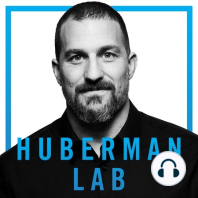81 min listen
Science of Social Bonding in Family, Friendship & Romantic Love
FromHuberman Lab
ratings:
Length:
91 minutes
Released:
Dec 20, 2021
Format:
Podcast episode
Description
This episode I discuss the science of social bonding- the process by which we form attachments. I explain the neural and hormonal basis for "social homeostasis" (our drive for a given amount of socializing) which reveals why we get lonely, why we seek out connection with others and how power dynamics (hierarchies) shape those connections. I also discuss the neurochemical basis of introversion and extroversion, of trust and how shared experiences that promote similar physiological states in two or more individuals, leads to more rapid bonding. I also discuss how food and oxytocin play key roles in social bonding. This episode covers quality peer-reviewed science and practical tools for anyone seeking to find, build or end relationships. Thank you to our sponsors: ROKA - https://www.roka.com - code "huberman" InsideTracker - https://www.athleticgreens.com/huberman Magic Spoon - https://www.headspace.com/specialoffer Our Patreon page: https://www.patreon.com/andrewhuberman Supplements from Thorne: http://www.thorne.com/u/huberman Social: Instagram - https://www.instagram.com/hubermanlab Twitter - https://twitter.com/hubermanlab Facebook - https://www.facebook.com/hubermanlab Website - https://hubermanlab.com Newsletter - https://hubermanlab.com/neural-network Timestamps: 00:00:00 Social Bonding: Child-Parent, Romantic, Friendship, Breakups 00:02:55 ROKA, Athletic Greens, Headspace 00:07:08 Social Bonding as a Biological Process 00:10:03 Social Isolation 00:13:32 Social Homeostasis & Neural Circuits for Social Drive 00:18:55 Brain Areas & (Neuro)Chemistry of Social Drive 00:22:48 What is Social Homeostasis & Dopamine 00:27:00 When We Lack Social Interactions: Short- Versus Long-Term 00:28:10 Introverts & Extroverts 00:31:00 “Good” Versus “Bad” Social Interactions & Hierarchies 00:33:54 Loneliness & Dorsal Raphe Nucleus & Social Hunger 00:37:33 Tools 00:38:05 Socializing & Food Appetite: Crossover Craving 00:42:45 Falling in Love 00:45:05 Tools for Social Bonds: Merging Physiologies; Story 00:53:54 Childhood Attachment Patterns in Adulthood 01:03:45 Attachment Styles: Autonomic Versus Intellectual Attachment 01:06:10 Emotional Empathy & Cognitive Empathy, Arguing 01:09:45 Allan N. Schore & “Right Brain Psychotherapy” 01:10:40 Oxytocin & Trust, In Males Versus Females, Hormonal Glue 01:16:10 Repairing Broken Bonds to Self & Others 01:18:56 Social (Media) Butterflies: Biological Basis 01:24:08 Key Points for Bonding & Understanding Social Bonds 01:27:07 Breaking Up 01:28:36 Synthesis 01:31:17 Zero-Cost Support, Sponsors, Patreon, Thorne, Instagram, Twitter Please note that The Huberman Lab Podcast is distinct from Dr. Huberman's teaching and research roles at Stanford University School of Medicine. The information provided in this show is not medical advice, nor should it be taken or applied as a replacement for medical advice. The Huberman Lab Podcast, its employees, guests and affiliates assume no liability for the application of the information discussed. Title Card Photo Credit: Mike Blabac - https://www.blabacphoto.com
Released:
Dec 20, 2021
Format:
Podcast episode
Titles in the series (100)
Master Your Sleep & Be More Alert When Awake | Episode 2: Today's episode provides a host of information on what makes us sleepy, sleep soundly, and feel awake and alert. It covers a broad range of tools for anyone wishing to improve their sleep and wakeful state. The science and logic for each tool is... by Huberman Lab
